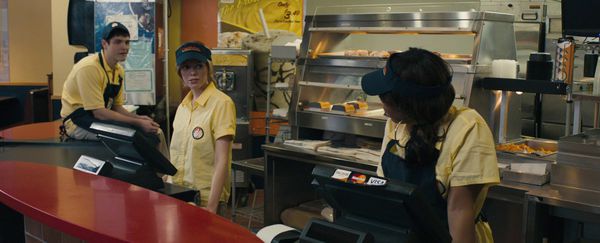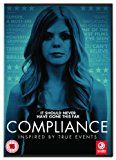Eye For Film >> Movies >> Compliance (2012) Film Review
Compliance
Reviewed by: David Graham

This year's Sundance furore over Compliance - whereby viewers shouted at the screen, stormed out in droves and hurled abuse during the Q & A - is perhaps indicative of the film being too successful in its purpose for sensitive audiences to appreciate, rather than betraying any dubious practice on sophomore director Craig Zobel's part. Tellingly, some of the cat-calling crowd went on to display misogynistic traits by referring to actress Dreama Walker as 'appealing' in her nude scenes, when the film goes to great pains to avoid the titillation it eventually portrays. A painstaking recreation of a real incident that occurred in varying forms and states over the course of a decade, it's a necessarily discomforting watch that's made with enough skill and verve to reverberate around your brain for days.
Fast-food diner manager Sandra is having a day from hell: someone has left a freezer unlocked overnight spoiling thousands of dollars' worth of produce, half of her staff have called in sick, a mystery shopper is supposed to be paying a visit plus she's nearly out of pickles and bacon. And it's still only Friday. The last thing she needs is one of her employees being accused of stealing from a customer, but when a cop calls to inform her of the alleged crime, she finds herself conducting a vicarious interrogation of her pretty young counter-girl Becky. As the officer's requests become more intrusive, Sandra struggles with her conscience since Becky is adamant she has done nothing wrong. The voice on the phone seems to know eveything about the girl and stresses that the current situation may prevent Becky being taken straight to jail, the threat of which keeps her compliant. But as more people get involved, events spiral out of control, even as doubts arise as to the veracity of the caller's identity and motives.

Compliance is a confronting film that could easily be performed on stage to much the same effect, but Zobel keeps suspense levels running high through edgy camerawork and tight framing, injecting just enough style to transcend the sort of naff dramatic reconstructions favoured by TV documentaries. The central performances are crucial to the viewer's engagement with what on paper would look to be a dry, un-cinematic endeavour; Ann Dowd and Dreama Walker take full advantage of the opportunities for some subtle, culture-clash humour before diving straight into roles charged with internal conflict and fraught with external friction between each other. All the supporting actors provide important back-up that keeps the viewer increasingly on the edge of their seat in hope that someone might come to their senses, from Pat Healy's gloating 'officer' to Philip Ettinger's concerned and disapproving co-worker, while Bill Camp is particularly impressive and upsetting in a role designed to provoke outrage, but it does cleave close to the absolute truth (the entire incident was caught on camera - let's not go there).
It's a story that speaks volumes about the sort of society where innocent people live in such fear of authority that they're willing to be violated (even when they know they've done nothing wrong) in order to protect their white-bread lives. Some viewers will scoff at the characters' perceived stupidity, but the situation escalates skilfully and inexorably enough to keep us involved with everyone's plight. To Zobel's credit, every participant on the receiving end is portrayed as a victim, albeit to a different degree. There is also a satisfying - and perhaps unfashionable, given art-house cinema's penchant for ambiguously abrupt endings - amount of time spent on the aftermath of the ordeal, with Dowd giving a heartbreaking climactic interview that highlights how guilty her character feels as well as how little sympathy she received. A couple of unnecessarily lengthy observational scenes break up the tension, but otherwise, Zobel makes intensely claustrophobic use of hs probing camera and stifling location, queasy close-ups of frying fast-food and messy workstations serving as effective if obvious metaphorical images for Becky and Sandra's mental states.
This may not be a traditional horror film but it burrows into your brain and under your skin in the same way as the most disturbing genre flicks. There are many telling details that highlight how easily this could happen: the gulfs between class, age and sex in the workplace and between positions of authority all play their part, while Sandra's resentment of her young, pretty charge undercuts much of her apparent discomfort with a vague sense that she may actually feel empowered by heading this interrogation (who wouldn't when your whole life's work has left you managing a 'Chickwich' restaurant?).
No easy answers are offered as to why anyone would commit such an elaborate and destructive hoax with no perceivable gain (it must in fact be costing him a small fortune in the calling cards he relies on for anonymity); the perpetrator does not appear to get any sexual gratification from his coercion, although briefly glimpsed police magazines hint at his fetish serving as an escape from a banal white-bread existence. His skill at psychological manipulation betrays the fact that he's performed this routine many time, and his deceitful flattery is a particularly cruel tactic for making the obviously good-natured and eager-to-please Sandra duplicitous in Becky's systematic degradation. Scenes where he nonchalantly makes sandwiches and potters around his suburban home while conducting the call offer insight into one of the most disconcerting aspects of the story; the notion that the middle class may be so bored and unfulfilled that they want to abuse and take their frustrations out on the working class they feel so superior to.
While it may not be an enjoyable experience, it's a wholly necessary depiction of an unbelievably warped incident that could in some form or another happen to any of us. As with many films of this ilk, the simple act of viewing makes the audience review their own complicity in its raison d'etre; why do we need to put ourselves through these psychological wringers? What is it that draws us to such accounts of suffering? The power of Compliance lies in its tightrope walking between exploitation and examination; it's as gripping as the most lurid thriller but leaves us to ponder our own niggling questions. As with Stanley Milgram's infamous Sixties experiments (which may have inspired the real-life crimes), there's endless food for thought here; the story is undoubtedly a dramatic goldmine that Zobel must have felt blessed to be able to delve into, but the care and control with which he does so marks him out as a brilliantly self-aware and self-assured film-maker.
Reviewed on: 18 Nov 2012



















